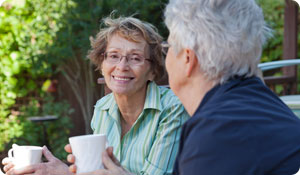
When you're facing a serious illness like cancer, taking these healthy steps every day can help you feel more in control, and perhaps even ease your concerns a bit. Here are some practical and emotionally beneficial daily activities to consider:
1. Exercise. Physical activity can boost mood, reduce fatigue, and improve overall quality of life. You don't have to exhaust yourself to benefit from exercise; try a brisk walk or some gentle stretches.
2. Listen to your body and learn to recognize what feels normal—and what doesn't. Report sudden or unexpected symptoms to your physician.
3. Plan for your medical appointments. Jot down questions and concerns as they occur to you, so you won't have to rely on your memory, which may fail you in the stress of the moment. Keep track of all information on tests, procedure dates, results, medications, and doses.
4. Take care of your hair and skin. Cancer treatments can cause blotches and dry patches on the skin as well as hair loss. Use hypoallergenic and fragrance-free products to minimize the risk of allergic reactions and irritation. Use 100 percent aloe to soothe radiation burns, and wear a broad-spectrum (UVA- and UVB-screening) high SPF sunscreen every day. Stick to the basics and save the spa for when treatment ends.
5. Write in a journal. Evidence suggests that recording your feelings and experiences can help you deal with grief, reduce stress and depression, and provides an outlet. It may even strengthen your immune system.
6. Hydrate. Drink plenty of water and clear fluids such as green tea.
7. Participate in a support group. When you're having a difficult day, reach out to your network of fellow cancer patients. They can offer coping suggestions, or just listen.
8. Prevent infections. Cancer treatments wear down the immune system, making you vulnerable to infections. Keep your skin clean and moist, and wear protective gloves and be careful not to cut yourself shaving. Clean cuts and bites thoroughly, and bandage wounds promptly.
9. Rest and relax. Fatigue is a common symptom of both cancer and cancer treatments. Take time every day to do something relaxing-pray, meditate, practice yoga, or listen to music—whatever works for you.
10. Eat. You need to keep up your strength and manage side effects. Your food needs may change when you have cancer, so talk with your physician, oncology nurse, or dietitian about what you should and shouldn't eat. Eat protein when you are feeling well and have an appetite, and include foods with cancer-fighting power, such as
- berries
- cruciferous and dark leafy vegetables (like cabbage, turnips, and broccoli)
- whole grains
- legumes
- beans
- green tea
Save your favorite foods for non-treatment days so you can enjoy them without developing upsetting associations.
LeslieBeth Wish, EDD, MSS, reviewed this article.
Sources:
National Cancer Institute. "Support for People With Cancer. Eating Hints Before, During, and After Cancer Treatment." Web. January 2011. Accessed 16 June 2013. http://www.cancer.gov/cancertopics/coping/eatinghints.pdf
McGrath Boyle, Linda, PT, DPT CLT-LANA. "Lymphedema Self Care Tip Sheet."
The Abramson Cancer Center of the University of Pennsylvania. Web. Page last updated 17 October 2012. Accessed 16 June 2013. http://www.oncolink.org/coping/article.cfm?c=8&s=23&ss=188&id=996
National Cancer Institute. "What You Need To Know About Cancer." Web. 4 October 2006. Accessed 16 June 2013. http://www.cancer.gov/cancertopics/wyntk/cancer/
Cancercare.org. "Support Groups." Web. Accessed 16 June 2013. http://www.cancercare.org/support_groups
Makeupandbeautyblog.com. "Makeup and Beauty Tips for Breast Cancer Patients: Staying Beautiful Inside and Out!" Web. 12 October 2007. Accessed 16 June 2013.
http://www.makeupandbeautyblog.com/product-reviews/makeup-and-beauty-tips-for-breast-cancer-patients-staying-beautiful-inside-and-out-product-reviews-bath-tartes-sweet-dreams-lipstick/
Hamlin, Emily. "Skin Care and Hair Advice for Cancer Patients, survivors." Cleveland.com/The Plain Dealer. Web. 12 October 2011. Accessed 16 June 2013.The Plain Dealer http://www.cleveland.com/style/index.ssf/2011/10/skin_care_and_hair_advice_for.html
National Cancer Institute. "Fatigue (PDQ®)." Web. Page last modified 2 May 2013. Accessed 16 June 2013. http://www.cancer.gov/cancertopics/pdq/supportivecare/fatigue/Patient
National Cancer Institute. "Managing Chemotherapy Side Effects. Fatigue (Feeling Weak and Very Tired)." Web. Revised February 2012. Accessed 16 June 2013.
http://www.cancer.gov/cancertopics/coping/chemo-side-effects/fatigue
National Cancer Institute. "Managing Chemotherapy Side Effects. Infection." Web. Revised February 2012. Accessed 16 June 2013. http://www.cancer.gov/cancertopics/coping/chemo-side-effects/infection.pdf
National Cancer Institute. "Managing Chemotherapy Side Effects. Skin and Nail Changes." Web. Revised February 2013. Accessed 16 June 2013. http://www.cancer.gov/cancertopics/coping/chemo-side-effects/skin-and-nail.pdf.
National Cancer Institute. "Managing Chemotherapy Side Effects. Appetite Changes." Web. Revised February 2012. Accessed 16 June 2013. http://www.cancer.gov/cancertopics/coping/chemo-side-effects/appetite.pdf
National Cancer Institute. "Managing Chemotherapy Side Effects. Memory Changes." Web. Revised February 2012. Accessed 16 June 2013. http://www.cancer.gov/cancertopics/coping/chemo-side-effects/memory.pdf
Smith KB, Pukall CF. "An Evidence-Based Review of Yoga as a Complementary Intervention for Patients with Cancer." Psychooncology 2009; 18(5): 465-75. Web. Accessed 16 June 2013. http://www.ncbi.nlm.nih.gov/pubmed/18821529
Nelson, Roxanne. "Yoga Practice Improves Sleep Quality and Reduces Fatigue in Cancer Survivors." Medscape Medical News. Web. 26 May 2010. http://www.medscape.com/viewarticle/722387
Bower Julienne E., Woolery Alison, Sternlieb Beth, and Garet Deborah. "Yoga for Cancer Patients and Survivors. Cancer Control 2005; 12(3): 165-171. Web. http://www.ncbi.nlm.nih.gov/pubmed/16062164
Hitt Emma. "Exercise Intervention Improves Fatigue, Other Outcomes in Cancer Patients." Medscape Medical News. Web. 12 March 2010 .
http://www.medscape.com/viewarticle/718410





